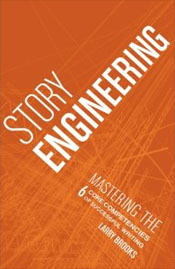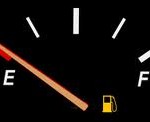 It seems every author has at least one book on writing they feel every other writer needs to read. For me, this one rises head and shoulders above all the others. Larry Brooks‘ often blunt and always brilliant exploration of what he calls the physics of storytelling is game changing.
It seems every author has at least one book on writing they feel every other writer needs to read. For me, this one rises head and shoulders above all the others. Larry Brooks‘ often blunt and always brilliant exploration of what he calls the physics of storytelling is game changing.
I actually read two of Larry’s e-books that were wrapped up into his final, polished product known as Story Engineering. They were Story Structure – Demystified, and The Three Dimensions of Character. They can be downloaded separately as PDFs from Larry’s site for only $3 each, but just buy the full Story Engineering book. You won’t regret it.
What makes Story Engineering so brilliant? It’s clear, it’s easily understandable, and it works.
I’ve read several other great books on writing, but never did any of them strike me with such power as this one. The journey toward becoming a professional writer is much like climbing a high mountain. We hit peaks in our journey that only reveal another peak rising behind it, a peak we couldn’t see before. We can get stuck on those smaller peaks, not sure how to proceed or to climb higher.
That was where I found myself when I discovered Larry Brooks’ physics of story telling. I had already completed two manuscripts, but I was stuck. I knew there was a problem with my story, even though it was so much better than anything I’d ever written before. Unfortunately, I couldn’t identify the issue, so I couldn’t fix it.
Then I learned about the underlying structure that needs to exist in any successful story. Larry lays it all out: The four-part structure, which I had heard of before, but with the mission and context of each part clearly explained, and the reasons why the story must shift at specific points to maximize its power. I’ve never found another explanation that so clearly lays it all out in a way that any story can be measured against it.
Some things the book answered for me were:
Why can’t we have the first plot point in chapter 1?
What needs to exist after the first plot point, where the hero learns his true mission, the stakes involved, and what force of opposition stands in the way?
What needs to happen at each of the other major milestones of the story to maximize its power?
How do I know if a scene really belongs in the book, and where it should be placed?
And much more.
In his Story Engineering book, Larry adds to the foundational structure, or physics, of a great story, by explaining what he calls the other ‘core competencies’ of writing required to make a story great. These include:
Concept
Character
Theme
Structure
Scene Execution
Writing Voice
If you can’t explain exactly what each of these are, particularly in context to your manuscript, you need this book. As he points out, the first 4 are elements of a great story, the raw material you craft your story with. The final two are the process of execution, where the art meets the physics.
Larry is clearly a proponent of story planning and outlining. I’ve moved in that direction myself and found I can reduce the amount of rewriting substantially. However, for authors who are free-writers or discovery writers or ‘pantsers’, this knowledge is still vital. The early draft(s) for discovery writers are the search for story, just like story planners’ outlines. Only when they know the story they need to write and understand how all these core competencies fit into their story can they finally write a draft that will work.
I can’t recommend this book enough.
Another aspect of craft that Larry explores in his Story Engineering is found in the Three Degrees of Character. I’ve read other great books on character, but again I found Larry’s blunt, clear style incredibly powerful. He drills deep and lays truth bare in a way that authors can use it instantly. Within each of those three degrees of character are seven categories that need to be defined. Once an author understands these, they can be mixed and combined in almost infinite combinations to produce memorable, unique characters.
The three degrees of character are powerful. He explains them as:
1st degree: Surface Affections and Personality – what we show the world externally.
2nd degree: The inner landscape, the reasons why the character chooses to express themselves as they do to the world externally.
3rd degree: The very inner soul of the character, perhaps not known even to them in advance, where they show their true nature under extreme pressure. This is the dimension that ultimately defines character.
For example, if anyone has watched the Firefly SciFi series, the captain of the Serenity is a great example of a complex character.
1st dimension (the face he shows the world): He’s a tough-as-nails, no-nonsense character who will kill without remorse, and engage in illegal activities for a living.
2nd dimension (why): He fought against the empire that rules the galaxy, but his side lost. He does what he does to stay free and gain little victories against an enemy he still hates.
3rd dimension (true character): He will risk his life to save people he could easily justify sacrificing. He’s a man of honor who will risk everything to save those he loves or to fight tyranny. But he’ll punch you out if you say that to his face.
This is powerful stuff, and liberating when an author understands it. I need to review it again since character development is still one of my weaker skills, but the toolchest is there. I just need to train myself to use it.
For any author who really wants to master the toolbox we use to craft great stories, get Larry Brooks’ Story Engineering book and study it carefully. It will open doors of understanding and illuminate the path to the next peak in your writing career.




